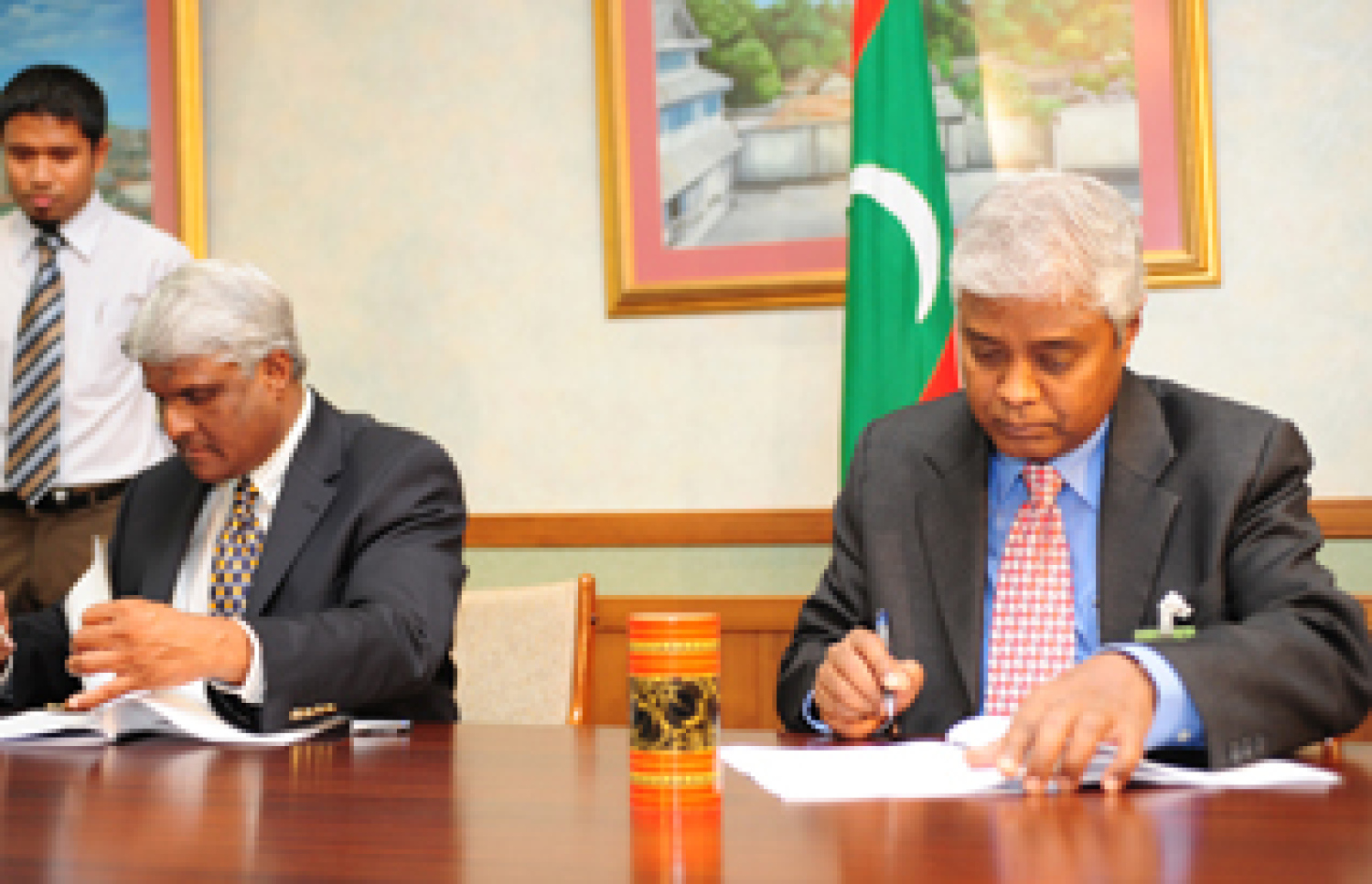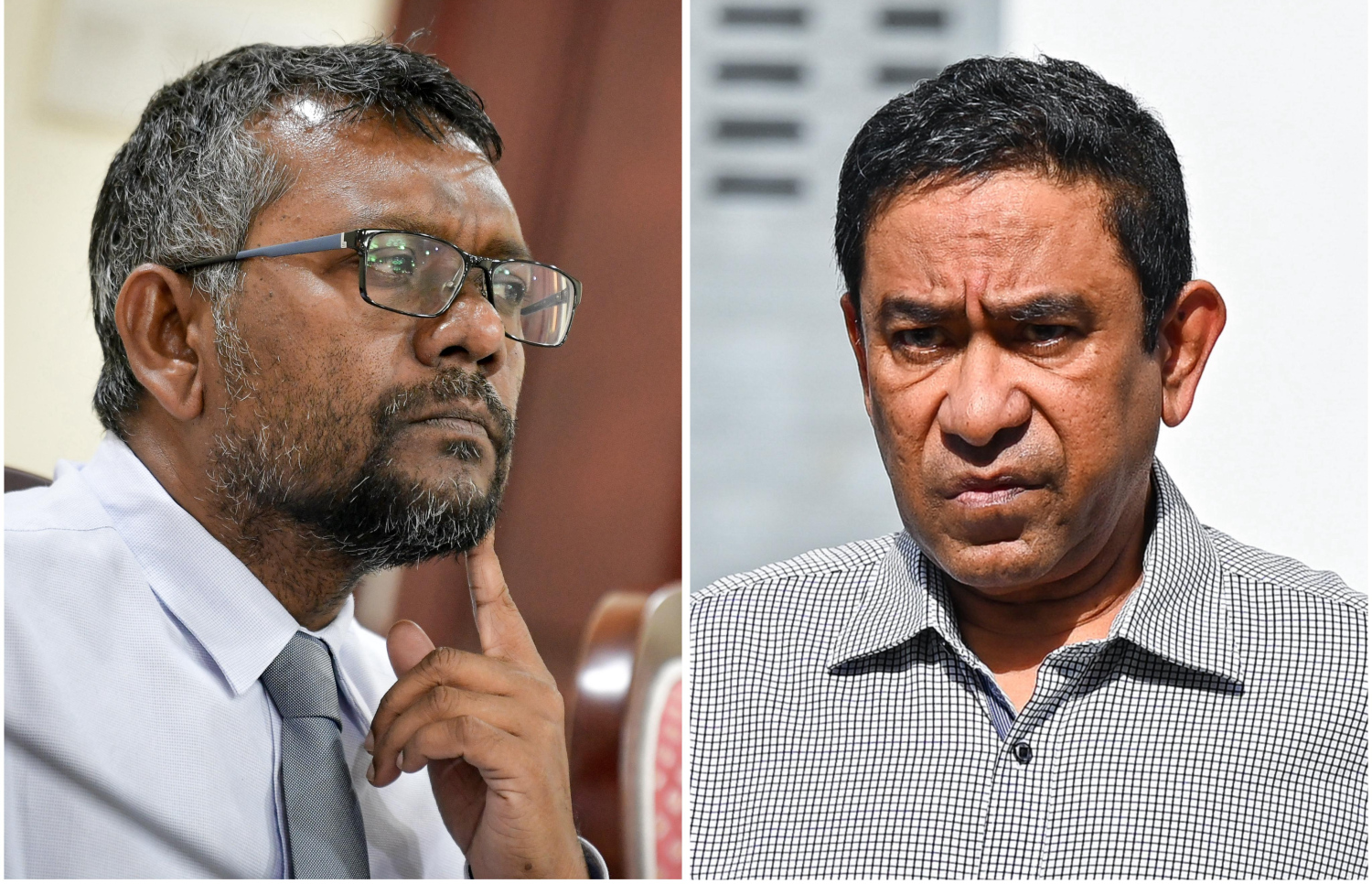Former President Abdulla Yameen delivered a pointed response last night to criticism from former Economic Minister and Maldivian Democratic Party (MDP) Chairperson Fayyaz Ismail, who recently claimed that the bulk of the Maldives’ foreign debt was accumulated under Yameen’s administration to finance the new terminal at Velana International Airport (VIA).
Speaking at a meeting of the People’s National Front (PNF), Yameen refuted the allegations and launched a broader attack on the opposition Maldivian Democratic Party (MDP), accusing it of a long-standing pattern of "trading the nation’s assets".
Yameen cited the controversial 2010 lease of VIA to Indian infrastructure giant GMR during former President Mohamed Nasheed’s tenure, arguing the deal was financially damaging to the state. According to Yameen, prior to the lease, Maldives Airports Company Limited (MACL) was earning MVR 300 million annually. After GMR took over, the state received just MVR 15 million in the first year of the 25-year concession agreement.
“From MVR 300 million to MVR 15 million—is that what you call a good business deal?” Yameen asked, criticising the terms and transparency of the lease agreement.
He further alleged that efforts were made under then-Finance Minister Mohamed Shihab to reduce jet fuel prices and grant concessions to GMR, which he claims benefitted the company at the expense of the state.
Yameen also questioned the disbursement of USD 78 million reportedly paid to GMR as part of the lease arrangement. “No one knows what happened to USD 12 to 15 million of that amount,” he said, citing findings from the parliamentary Finance Committee that suggested the sum was spent on the living expenses of GMR’s experts in the Maldives.

“USD 320 million in compensation [for contract termination] is visible. But the rest? That money was misappropriated,” he said.
Following the cancellation of the GMR contract, Yameen asserted that MACL’s revenues significantly improved. He claimed the company’s profits rose to MVR 1.3 billion by the end of his term in 2018. By comparison, he noted MACL posted a profit of MVR 1.1 billion last year.
Yameen described the MDP government’s decision to lease the airport as "milking the nation," claiming there was never any serious intent to develop the airport. “It was a state asset given away for free,” he said.
Turning his attention back to the VIA terminal project, Yameen challenged Fayyaz’s criticism of the project’s debt burden. He questioned why, if the new terminal was such a financial misstep, construction wasn’t halted during Fayyaz’s tenure in government.
“At the time this administration took over, only the foundation of the new terminal was laid. If it was such a bad decision, why didn’t he stop it?” Yameen asked, adding that the project continued “at full speed” under Fayyaz’s watch.
Yameen also claimed that while his administration initially budgeted USD 357 million for the new terminal, the figure ballooned to USD 600 million under the MDP-led government. He characterized the increase as "the money they ate"—a thinly veiled accusation of corruption.
Yameen expressed frustration that the MDP government’s officials, including Fayyaz and former President Ibrahim Mohamed Solih, are not personally bearing the cost of the terminal construction. He reiterated that the GMR deal under Nasheed's government included substantial fee waivers and concessions, further asserting that these decisions had long-term financial consequences for the state.
Fayyaz Slams Yameen’s Airport Terminal Decision as “Stupidest in Maldivian History”
Former Economic Minister Fayyaz Ismail had earlier launched a scathing critique of former President Abdulla Yameen’s decision to take on significant foreign debt to build the new terminal at Velana International Airport (VIA), calling it a politically motivated move that has cost the Maldivian economy dearly.
In a post on X (formerly Twitter) earlier this week, Fayyaz accused Yameen of dismantling a no-cost airport development agreement with GMR—signed during President Dr. Mohamed Waheed’s administration—in pursuit of political gain. He argued that the decision to cancel the contract and instead fund the terminal through sovereign debt was both financially reckless and economically damaging.
“This is the stupidest decision ever made by a President of Maldives,” Fayyaz wrote. “It closed the opportunity to raise funds for other urgent national needs.”

According to Fayyaz, the Maldivian government under Yameen paid USD 271 million (MVR 4.1 billion) in compensation to GMR in November 2016 after unilaterally terminating the contract. This included USD 160 million borrowed under a sovereign guarantee from an Indian bank during the GMR era—debt which he noted still burdens the state.
Fayyaz further claimed that if Yameen’s administration had not pursued the terminal project through borrowing in 2014, the Maldives would today be welcoming four million tourists annually and enjoying a per capita income double the current national GDP.
“The economy has lost USD 60 billion because of a decision made by a leader for political purposes,” he said, describing the fallout as the product of flawed and self-serving economic thinking—what he called “frontonomics.”
While Fayyaz did not mention Yameen by name, the reference was unmistakable. He concluded that the responsibility for this massive economic loss should lie squarely with the person who, he said, “pretended to be a better economist” while making fiscally irresponsible choices.
Fayyaz, who has recently reunited politically with former President Mohamed Nasheed, reiterated his long-standing opposition to incurring debt for the development of VIA—a stance Nasheed also shares.